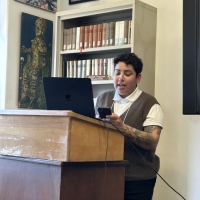Black Lives Matter
The Comparative and World Literature Department at San Francisco State University would like to affirm our support of the peaceful protests and the driving impetus behind the Black Lives Matter movement of the past several weeks across the US and the world since the murder of George Floyd by a Minnesota police officer. While the killing of an unarmed African-American citizen has been all too common, our response must be different from before and must reflect the urgency of this moment. As a department, we want to reiterate our commitment to the values of San Francisco State University: to uphold thoughtful reflection and intellectual interrogation of all systems of racial discrimination, bias, and exclusion.
As teachers and scholars of Comparative and World Literature, we embrace the study of literature and other forms of cultural production from communities and contexts beyond our own. We cultivate an appreciation for historical and cultural differences, and we are invested in questioning many of the longstanding narratives that have been told about others—especially African Americans and those subjected to violence, slavery, and colonialism. Our work as a department is to foster curiosity about and respect for what we might not know or might not have been exposed to, and to encounter literatures and the ideas from which they spring with fresh perspectives, a deep respect for crossing boundaries, and an eye toward building bridges.
We find ourselves in this moment in the United States understanding that we must do more. We must further engage in difficult conversations that in some ways are extensions of the work we already are doing around literature and the world. Our work is grounded in the fundamental belief that without curiosity, empathy, and deep questioning, we are likely to miss so much. We affirm that we will continue to practice these principles and that we will make every effort to connect the study of artistic expression from many times and places to the US context in this moment. We hope you’ll join us in asking the deep and painful questions about how we can study and teach to dismantle and eliminate racism and its structural and systemic support.
We hope you’ll join us in this urgent and long overdue mission, a journey not only of the intellect but also of the heart.
Sincerely,
The Faculty and Staff of Comparative and World Literature
